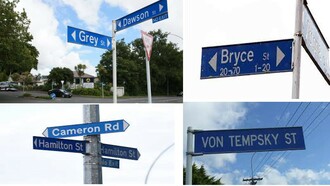Search result for "New Plymouth ".
-
Don’t cast us adrift! Ensure Cook Strait ferries can carry trains.We ask that the government ensure replacement Cook Strait ferries are rail-enabled.8,883 of 9,000 SignaturesCreated by Patrick Rooney

-
Open Letter: Income support must go up before ChristmasRaise income support to unlock whānau and individuals from poverty before Christmas.902 of 1,000 SignaturesCreated by Team ActionStation

-
Compulsory Consent Education in SchoolsWe request that the Ministry of Education pass legislation that makes age appropriate consent education compulsory from years 1 -13. We also request the Ministry to honour Te Tiriti o Waitangi by empowering te ao Māori perspectives and teaching methods around consent. It must be a mandatory requirement for consent education to be holistic, comprehensive, culturally safe and inclusive of our LGBTQ+ communities. With these requests, our aim is to protect our ākonga by making consent education compulsory across all schools and kura in Aotearoa New Zealand4,119 of 5,000 SignaturesCreated by Genna Hawkins Boulton

-
Māori self-determination for HealthWe call for the Government to adopt Māori commissioning by the Māori Health Authority. This will be a transformational way to achieve health equity as outlined in the majority 'alternate' view by the Expert Panel of the Health and Disability System Review.1,687 of 2,000 SignaturesCreated by Emily Gill
-
Rename Colonial Street Signs in Kirikiriroa/Hamilton City.Dear Hamilton City Council, Please remove ALL colonial names on street signs in Kirikiriroa/Hamilton City that do NOT reflect integrity.55 of 100 SignaturesCreated by Jacquelyn Elkington
-
Protect Porirua East!By signing this petition you are supporting Housing Action Porirua's official submission on the Porirua City Council District Plan. Including: ★ Ensuring high standard of amenities for all by opposing the division of suburbs into General Residential Zone and the Medium Density Residential Zone resulting in the latter zone having significantly higher density and lower standards of residential amenity are allowed. Support the same rules for all and a high standard of residential amenity for all. ★ Support residential apartments being developed in the city centre area and oppose the future residential zones being proposed until the potential to provide more housing within the existing urban area has been reasonably exhausted. ★ Ensure provision of fully accessible homes for disabled people, including wheel chair users. Ensure all new builds are accessible and manoeuvrable for wheel chair users, including accessible bathrooms on the ground floor. ★ Prioritise adequate and safe walking and cycling provisions to encourage less private car usage. ★ Ensure that all new buildings are constructed with built-in solar power systems including receptors in roof designs. ★ Require carefully dismantling of current buildings to ensure timber, wiring, piping and roofing materials can be reused and recycled. You can read Housing Action Porirua's full submission here: https://tinyurl.com/yylhz74k570 of 600 SignaturesCreated by Housing Action

-
Make a Fair Permanent Residency Path for Parent Visa HoldersWe envision an Aotearoa where families are united, children are supported by the presence and love of their parents, and parents are free to share in the joys and milestones of their children’s lives. In this vision, families feel a sense of belonging, contributing to a harmonious and inclusive society where intergenerational bonds strengthen communities and enrich New Zealand’s social fabric. Currently, there is a 10-year condition for Parent Resident Visa holders to become eligible for permanent residency. This condition creates significant travel restrictions, preventing parents from attending to personal or family matters abroad without jeopardizing their residency. It also imposes unnecessary emotional and financial burdens on families who are already contributing socially and economically to New Zealand. This lengthy requirement is unfair compared to the 2-3-year pathways available for other residency categories, and undermines the principles of equity and inclusivity that Aotearoa stands for. As a parent visa holder said, "All we want is to grow old with our children, to watch our grandchildren laugh and learn, and to feel that we truly belong in the place we call home. A fair residency pathway would mean our sacrifices have not been in vain." Children are equally affected: "Home is where my parents are, and yet, every day, I live in fear that their future here is uncertain. A permanent residency pathway is not just for them—it’s for the families who dream of staying together, building lives, and contributing to this beautiful country."1,460 of 2,000 SignaturesCreated by Pakistan and Friends Hawkes Bay Ahlulbayt Assoc.
-
Make food regulations fair and affordable for small businessesWe call on you to end discriminatory food charges and regulatory requirements which place an unfair and unrealistic burden on small food businesses – particularly small food producers, food stall holders, mobile food vendors, coffee carts, food trucks, and low-risk businesses (e.g home businesses like cake artists) - and undermines their ability to survive in the current economic climate. We expect all small food businesses to uphold the same standards of food safety as the rest of the industry, however compliance for small businesses needs to be affordable and simple enough to keep them financially and logistically viable; especially as so many are struggling to stay afloat due to current economic challenges. We ask that you: - Revoke MPI's ability to charge all food businesses in New Zealand the same annual Food Act levy regardless of size or level of risk posed to consumers. By charging a flat fee for all domestic food producers, this levy unfairly penalises small businesses. Furthermore, the proposed services of New Zealand Food Safety (NZFS) are unlikely to have any tangible benefits for small food businesses (despite proposed theoretical benefits) therefore we disagree with levying them at all for these services. - Revoke MPI's ability to charge the Food Act levy per site or premise registered. Charging per site has the adverse effect of penalising small food businesses (such as those selling at markets) and mobile food vendors (such as coffee and food carts), that have one premise for food preparation and a second (mobile) premise for selling their food (even if they only run a stall once a week). These mobile vendors will have to pay at least double the levy large restaurants pay, even though cafes and restaurants can open all day, every day. - Significantly decrease and limit onerous regulation requirements and fees for small businesses to comply with food safety rules in order to protect their viability. The current fees are crippling for small businesses. We are aware that territorial authorities (local councils and independent auditors) set fees for registration and verification and is theoretically outside of government control. However, NZFS influences the cost of registering with territorial authorities and dictates how a business is verified. Verification of small food businesses is too intense - and therefore expensive - and overly onerous for them. We ask that NZFS be required to find more realistic and affordable ways for small businesses to comply with food safety regulations. - Create a fairer regulation and fees system, potentially based on number of staff employed, gross income declared to IRD, and/or hours/days open. The food act is meant to take a risk-based approach to food safety, yet the current regulatory framework ignores three key risk factors: the size of a food operation and the duration and frequency it is operating for. Both of these are related to another risk factor: the quantity of food a business sells. Because these are not considered, regulatory requirements for small businesses are overly burdensome and expensive as these businesses are treated like large, full-time operations. - Require inclusion of small food businesses in considering and developing changes to food regulation and fees, not just afterwards in a consultation period. No representatives from the food industry, especially small businesses, were included in the development of the NZFS proposal to maintain and expand its regulatory services, therefore resources have been wasted on making changes that are not relevant to the industry, are unlikely to be effective and, therefore do not provide value for their investment. - Require NZFS to be accountable for its spending and ensure its use of resources are prudent while achieving genuine and measurable benefits to public health and the country's food safety reputation. We believe the spending of NZFS in the past has been frivolous. This includes spending money publishing and distributing a free food safety magazine that had no proof of efficacy (and is unlikely to have had high readership in the absence of other interventions to improve food safety culture) and producing expensive food safety advice videos that could have been filmed on a phone and produced in a matter of hours.1,834 of 2,000 SignaturesCreated by Ben Plows-Kolff
-
Secure the Māori seatsGive the Māori seats the same level of protection as every other seat in Parliament. The Māori seats are an integral part of our current Parliamentary system. We support the Electoral Entrenchment of Maori Seats Amendment Bill as they should be treated in the same way as other seats.2,392 of 3,000 SignaturesCreated by Max Harris
-
Fix the CodeWe are calling on NZTech and the Signatories to work with us to develop a process to #FixTheCode that meets the needs of everyone at risk of harm from these companies41 of 100 SignaturesCreated by Coalition for Better Digital Policy

.png)








